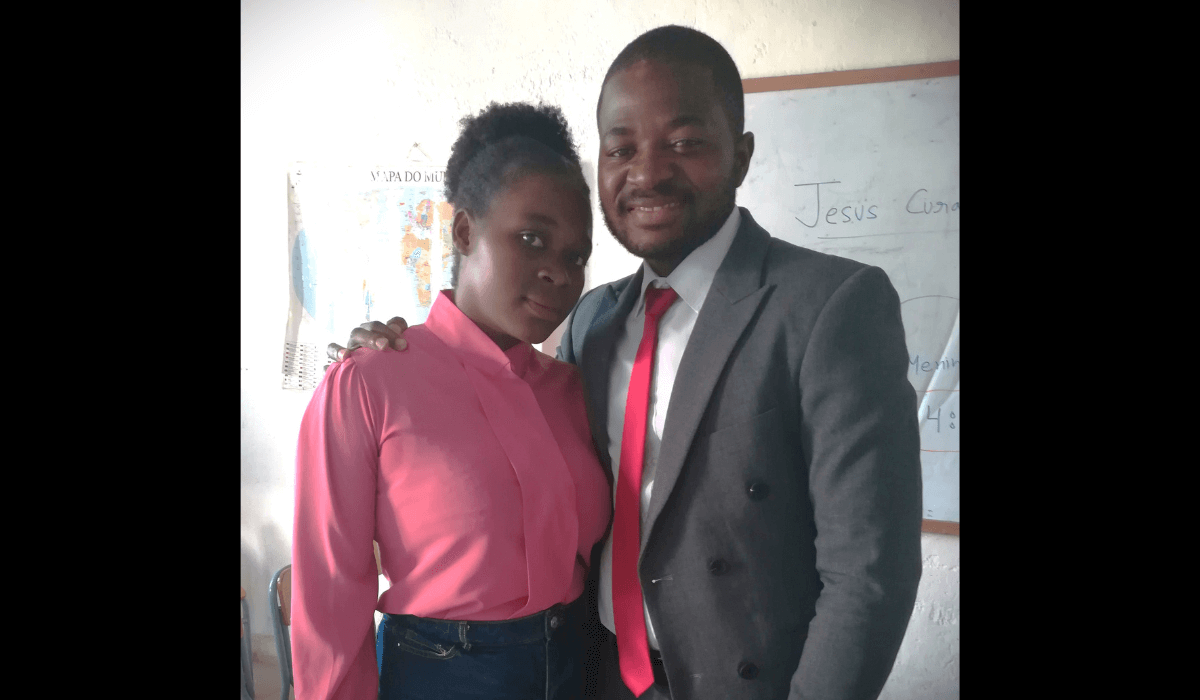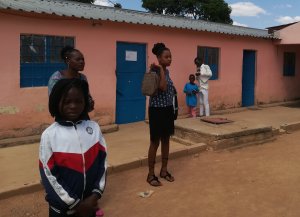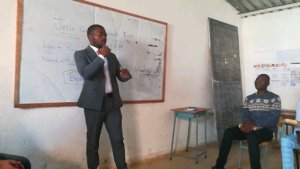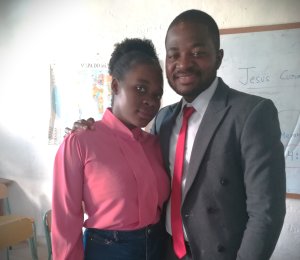A church of hope for the Deaf
Eduardo Chivinda

Listen to this article
The Huambo province in Angola was strongly affected by the civil war that hit the country after independence, leaving deep weaknesses in its social, economic, and structural systems. There is a need for almost everything and many struggle with daily survival. Amidst these difficulties, people with hearing impairments are left behind and forgotten. They are a silent presence and many do not notice their existence. The deaf get lost among the hearing but one church is noticing and making a difference.
Escola Pamosi: Together

Escola Pamosi
The Igreja Baptista do Calvário in Huambo is part of the Baptist Convention of Angola. It is pastored by Sabino Teck de Degamba and his wife, Rosángela Teck, who together spearhead the church’s Deaf ministry. Rosángela shares that they began the Deaf ministry because the church had three deaf children they couldn’t communicate with. They started looking for other deaf people and a survey around the church identified 28 children with special needs. The director of special education in the area challenged them in 2003 to create inclusion classes.
They built two mud classrooms for a pre-school class and a first-grade class. Classes began in March 2004, and onwards, support came from Brazilian Baptist churches through the Junta de Missões Mundiais, leading to the founding of the school, Escola Pamosi, which means “Together”. Alongside the school, the Deaf ministry also started at the Igreja Baptista do Calvário, and the first deaf person was baptized in 2005.
Escola Pamosi is one part of the ministry. There are also weekly Bible studies in small groups, Sunday school, interpretation during Sunday services, and a monthly city-wide meeting for deaf youth. Escola Pamosi currently serves 200 students including the deaf, intellectually disabled, visually impaired, Down syndrome, attention-deficit, and other students without special needs but from low-income families.
People with hearing impairments are left behind.
At the school, most students enroll after age nine, if they are brought. A small number of deaf students go on to higher education. Most of the deaf who attend university are oralized, meaning they became deaf after already being literate. Being deaf often means little access to important information. They rely on interpreters but there are moments when they are alone with no one to inform them about what is happening. They must draw conclusions only from what they see.
Deaf ministry
 The Igreja Baptista do Calvário was the first Baptist church to have a Deaf ministry. “We saw that some deaf people were coming from far away, so we decided to start the Deaf ministry in other churches where we had deaf members,” explains Rosángela. This was the foundation for the expansion of the ministry in the province. Since the creation of the ministry, deaf missionaries have been incorporated and the work has continued to other provinces with the intention of reaching more people with hearing impairments.
The Igreja Baptista do Calvário was the first Baptist church to have a Deaf ministry. “We saw that some deaf people were coming from far away, so we decided to start the Deaf ministry in other churches where we had deaf members,” explains Rosángela. This was the foundation for the expansion of the ministry in the province. Since the creation of the ministry, deaf missionaries have been incorporated and the work has continued to other provinces with the intention of reaching more people with hearing impairments.
In 2020, it became clear that there was a need to reach the deaf in the municipalities within the province and plant churches that, from the beginning, would focus on evangelizing and
discipling deaf individuals. The Radical Inclusion Project was thus born and two churches with a vision for inclusion were planted. The current focus is to reach the deaf in provinces with no Deaf ministry.
Training and sending

Francisco Cassinda Epamba
As part of the expansion plan to other provinces, interpreters and deaf workers have been sent to the provinces of Uíge, Moxico, and Benguela. The project has been progressing well but it needs to move faster because other religious groups are expanding in the area. The programme has been growing and the goal is to reach the deaf in all the provinces of Angola, including those in the villages.
With the launch of the first Angolan Sign Language dictionary, the teaching of sign language began. Since then, it has been taught to many people and many interpreters have been trained. Initially, Rosángela was the one teaching, but today, the instructors of Língua Gestual Angolana (L.G.A.) are deaf. The ministry offers different training modalities: some undergo theological training, others receive training for three to six months in the Radical Inclusion Project, and others participate in hybrid courses for deaf workers.
One of the teenagers at the time, Francisco Cassinda Epamba, participated in the sign language course. He had recently become deaf at the age of 15 and was very sad. Francisco understood the gospel, was baptized, and soon began presenting Jesus to other deaf people. Francisco grew spiritually and decided to attend seminary. He completed a bachelor’s degree in theology and the Brazilian Baptist Mission Board adopted him as a local worker. Francisco became the first deaf person to be ordained a pastor. He is responsible for the national expansion of the Deaf ministry in Angola.
Every semester, the seminary offers courses in sign language (based on the Angolan Sign Language dictionary compiled in Luanda) and trains hearing people to be sign language interpreters and Deaf church workers. Basic doctrinal courses are available for the deaf through an interpreter. Deaf people and their families are invited to take a course in Angolan Sign Language and to learn about Jesus. Interpreters are also trained to provide support during services and to assist the deaf and their families.
Rosángela’s hope is to start programmes in all the Baptist churches of Angola and send deaf missionaries door-to-door to find deaf people who are marginalized. Ultimately, the goal is to send workers to the villages around the cities where scattered deaf individuals have never been exposed to the gospel and do not have the opportunity to attend school.
Social impact
The Deaf ministry has made a difference in the lives of the deaf and their families. They developed communication, enabling integration into society, access to education and professions, the building of their homes, knowledge of Christ, and integration into local churches. Some left behind addictions and regained their dignity. Others became evangelists and missionaries. In Angola, the Deaf ministry operates in Huambo, Bié, Luanda, Namibe, Benguela, Uíge, Moxico, and Huíla. In the interior of Huambo, it is active in Longonjo and Ukuma. One lesson learned is that a deaf person cannot be isolated from family. The Deaf ministry must provide accessibility and integration into the family, the society, and the Kingdom of God.
Rosángela hopes that the Church in Africa will understand that the Gospel of Jesus Christ is for everyone and no one should be forgotten. She emphasizes: “The Church, by providing accessibility to the deaf, blind, intellectually, and physically disabled, shows love without favouritism. It is our responsibility to glorify God and be God’s instrument to promote his glory among all nations, all tribes, and all peoples, even those who do not use an oral language but a sign language. Our mission is to be witnesses to all and to prepare the Church to welcome everyone, including those with special needs. We must prepare favourable conditions for them to grow in Christ as any member of his body.”
Rosángela’s vision for reaching Angola’s Deaf has plenty of space for others to join. It goes beyond one person’s vision, and she is eager to work with others to evangelize and disciple the Deaf. Salvation is available to all who believe in Jesus (Jn. 3:16).
PRAY FOR:
- More Deaf ministry workers to be sent into the villages.
- God’s grace and provision for the Deaf ministry in Angola.
AfriGO magazine encourages the African church to send, support and pray for African missionaries.
 here
here